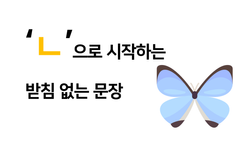Nov 1, 2022
받침없는 한국어 문장 읽기: Without final consonants(1)

학습목표 Learning outcomes
① 받침없는 문장을 읽을 수 있다.
② 발음교정을 통해서 한국어 실력을 향상시킬 수 있다.

단어 익히기(Vocab)
1. 가구 [gagu] n. furniture
2. 여우 [yeou] n. fox
3. 아이 [ai] n. child
4. 누나 [nuna] n. sister
5. 오리 [ori] n. duck
6. 우리 [uri] n. we
7. 다리 [dari] n. leg
8. 어머니 [eomeoni] n. mother
9. 바나나 [banana] n. banana
10. 바구니 [baguni] n. basket
11. 비 [bi] n. rain
12. 바다 [bada] n. sea
13. 나비 [nabi] n. butterfly
14. 나무 [namu] n. tree
15. 소라 [sora] n. conch
16. 사고 [sago] n. accident
17. 새 [sae] n. bird
18. 노래 [norae] n. song
19. 시소 [siso] n. seesaw
20. 이모[imo] n. aunt


받침없는 문장 읽기 Let's read sentence without final consonants
1. 고기야, 고기
[gogiya, gogi]
[It's a meet.]
2. 가구야, 가구
[gaguya, gagu]
[It's furniture.]
3. 이게 기구야.
[ige giguya.]
[This is a hot air balloon.]
4. 여기가 거기야.
[yeogiga geogiya.]
[Here is that place.]
5. 여우야, 이게 가구야.
[yeouya, ige gaguya.]
[Hey fox, this is furniture.]
6. 아이가 가요.
[aiga gayo.]
[The child is going.]

받침없는 문장 읽기 Let's read sentence without final consonants
1. 너, 누구니?
[neo, nuguni?]
[Who are you?]
2. 나, 여우야.
[na, yeouya.]
[I'm a fox.]
3. 누나, 내가 아우야.
[nuna, naega auya.]
[Sister, I'm your younger brother.]
4. 너구나, 너.
[neoguna, neo.]
[It's you.]
5. 내 나이, 네 나이.
[nae nai, ne nai.]
[My age, your age.]
6. 아기가 누나에게 기어가네.
[agiga nunaege gieogane.]
[The baby is crawling to my older sister.]

받침없는 문장 읽기 Let's read sentence without final consonants
1. 두 아이가 오다.
[ du aiga oda.]
[Two children are coming.]
2. 네 아이가 가다.
[ne aiga gada.]
[Four children are going.]
3. 드디어 여우가 가네.
[deudieo yeouga gane.]
[Finally, the fox is going.]
4. 너도 나도 다 아이야.
[neodo nado da aiya.]
[You and I are all children.]
5. 드디어 여기에 오다.
[deudieo yeogie oda.]
[Finally, I'm here.]

받침없는 문장 읽기 Let's read sentence without final consonants
1. 오리가 이사 가요.
[origa isa gayo.]
[The duck is moving.]
2. 아가야, 이리 오너라.
[agaya, iri oneora.]
[Hey baby, come here.]
3. 오리 두 마리가 거리로 나가요.
[ori du mariga georiro nagayo.]
[Two ducks go out on the street.]
4. 오리가 우리에게 오네.
[origa uriege one.]
[The duck is coming to us.]
5. 도리도 오리도 내게 오네.
[dorido orido naege one.]
[Dory and duck come to me.]
6. 여우야 저리로 가거라.
[yeouya jeoriro gageora.]
[Hey fox, go over there.]
7. 내 다리, 네 다리, 누나 다리
[nae dari, ne dari, nuna dari.]
[My legs, your legs, sister's legs.]

받침없는 문장 읽기 Let's read sentence without final consonants
1. 어머, 모기다.
[eomeo, mogida.]
[Oh my, it's a mosquito.]
2. 어머, 여우다.
[eomeo, yeouda.]
[Oh my, it's a fox.]
3. 어머니, 어머니, 우리 어머니
[eomeoni, eomeoni, uri eomeoni]
[Mother, mother, my mother.]
4. 이모, 고모, 그리고 내 어머니
[imo, gomo, geurigo nae eomeoni]
[Auntie, auntie, and my mother]
5. 이모, 거기가 어디야?
[imo, geogiga eodiya?]
[Auntie, where are you?]
6. 내 이마, 네 머리, 우리 다리
[nae ima, ne meori, uri dari]
[My forehead, your head, and our legs.]

받침없는 문장 읽기 Let's read sentence without final consonants
1. 바나나 바구니
[banana baguni]
[Banana basket.]
2. 비가 내리네
[biga naerine]
[It's raining.]
3. 바다가 보이고 배가 가고.
[badaga boigo baega gago.]
[You can see the sea and the boat goes.]
4. 나비야, 나비야, 이리 오너라.
[nabiya, nabiya, iri oneora.]
[Butterfly, butterfly, come here.]
5. 내 배, 바다에 배, 나무에 배
[nae bae, badae bae, namue bae]
[My stomach, the boat on the sea and the pear on the tree.]

받침없는 문장 읽기 Let's read sentence without final consonants
1. 소라 사러 가게에 가요.
[sora sareo gagee gayo.]
[I'm going to the store to buy conch.]
2. 스시 사러 가요.
[seusi sareo gayo.]
[I'm going to buy sushi.]
3. 사고가 나서 다리가 아야.
[sagoga naseo dariga aya.]
[My leg hurt because of an accident.]
4. 새가 노래 부르고 나도 노래 부르네.
[saega norae bureugo nado norae bureune.]
[The bird is singing and I'm singing too.]
5. 나무에서 새 소리가 나요.
[namueseo sae soriga nayo.]
[There's a bird sound coming from the tree.]
6. 저기에 시소가, 여기에 그네가.
[jeogie sisoga, yeogie geunega.]
[The seesaw is over there, the swing is here.]
복습 Review!
1. 내 나이, 네 나이.
2. 네 수저가 저기에, 내 바지가 여기에
3. 새가 노래 부르고 나도 노래 부르네.
By undefined
20 notes ・ 123 views
Korean
Beginner